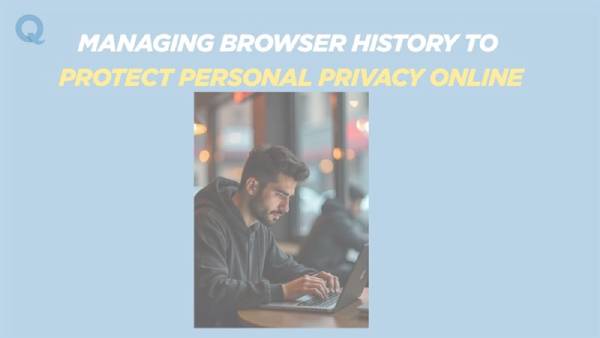You know that feeling when you’re done using your phone or laptop and you just close it without a second thought? Maybe you were watching videos, looking up school stuff, checking prices for something you want to buy, or just clicking around because you were bored.
Then you walk away, thinking it’s all over.
But actually, your browser like Chrome, Safari, or Firefox has quietly written everything down.
Yep. It remembers every site you visited. Every search you typed. Every click you made.
This is called your browser history, and while it can be helpful sometimes, it also means that your online activity is saved, and anyone who uses your device after you can see what you were up to.
So let’s talk about why browser history matters, and how you can manage it to keep your personal stuff private.
Wait, What Is Browser History Exactly?
Let’s keep it simple.
Every time you visit a website, your browser keeps a note of it. It records:
- The web address
- The date and time you visited
- How long you stayed
- Sometimes even what you clicked
Think of it like leaving footprints in the sand. Your browser follows you around and saves those steps, just in case you want to go back to them later.
This can be useful if you forget a website you liked, or need to go back to something important. But it also means your browser knows everything you’ve done online.
And if someone else gets on your device? They can follow those same steps right back through your online day.
Why Should You Even Care?
You might think, “It’s just history, who cares?” But here’s the thing: it’s your personal history.
Here’s why managing it is a smart idea:
- Other people can see what you’ve been doing.
If you let a friend borrow your phone or a family member uses your computer, they could easily open your browser and see what you were looking at. Maybe it’s not bad stuff, but it could still be private or embarrassing. - Websites track you using your history.
You search for a pair of shoes once, and suddenly ads for shoes are everywhere. That’s not a coincidence. Sites use your browsing history to follow you around and show you ads you might click on. - Hackers can learn a lot about you.
If someone steals your phone or hacks your computer, your history tells them a lot about what banks you use, what you shop for, even your location. That’s dangerous. - It clutters up your browser.
A super long history can also make your browser run slower. Cleaning it out keeps things neat and fast.
How to Check and Clear Your Browser History
Don’t worry. It’s super easy to clear your browser history. You don’t have to be tech-savvy.
Here’s how to do it on most browsers:
- Open your browser.
- Tap the three dots or lines (usually in the top corner).
- Tap “History.”
- You’ll see a list of websites you’ve visited.
- Tap “Clear browsing data” or “Delete history.”
- Choose how much you want to delete just today, the last week, or everything.
Done. It only takes a few seconds.
Some people like to clear their history once a week. Others do it every day. You can decide what works for you.
Use Private Browsing When You Want Extra Privacy
Most browsers have something called Incognito Mode or Private Mode.
When you turn this on:
- Your browser doesn’t save the sites you visit
- It doesn’t save search history
- It doesn’t save cookies or form info
This is great when you’re using someone else’s device, shopping for gifts, or doing something you just don’t want saved.
Just remember: private mode hides your history from others using your device but websites can still see your activity unless you use extra protections like a VPN.
Other Smart Privacy Habits
Managing your history is just one step. Here are a few more easy things you can do:
- Log out of websites when you’re done.
Especially on shared or public computers. - Don’t save passwords in your browser.
Use a password manager or write them down safely. - Be careful with public Wi-Fi.
Avoid checking private accounts like email or bank apps when using free Wi-Fi. - Turn off tracking in your browser settings.
Most browsers let you block sites from tracking your online moves.
Doing all this keeps your digital life safer and more private.
Teach Your Family Too
If you’ve got younger siblings or even parents who don’t know much about this stuff show them. They might not realize how much their browser is saving.
You could say:
“Hey, wanna see all the stuff your browser remembers about you?”
Then show them how to check and clear history. It’s a great way to help everyone at home stay safer online.
One More Thing For Parents Trying to Keep Kids Safe
Let’s be honest: kids are online a lot these days. And it’s tough for parents to keep up. If you’re a parent, or even just someone looking out for younger kids, check out qoli.ai.
It’s a super easy-to-use tool that helps you see what your kids are doing online without being too strict or creepy. It helps you have better conversations about online safety, and keeps things calm and open at home.
Honestly, more families should be using something like this. It’s a total game changer.
Final Thoughts: Your Browser, Your Rules
Your browser history might seem small, but it’s a big part of your online life. And it’s your choice what stays and what goes.
So next time you’re done browsing, take a few seconds to clear your history. Or try private mode if you want a clean slate.
You don’t have to leave a trail everywhere you go.
Stay smart. Stay private. And take control of your digital life because it’s yours.



